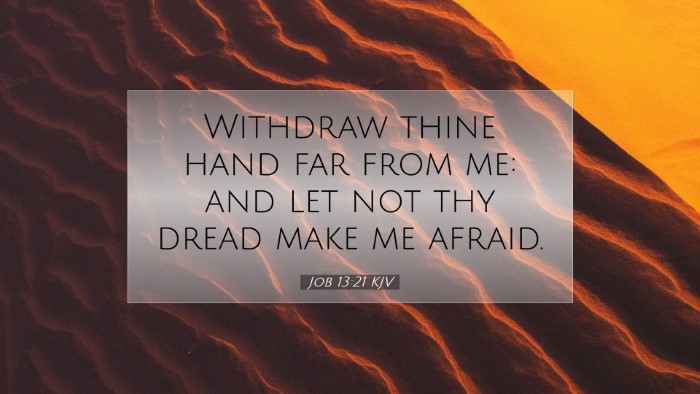Old Testament
Genesis Exodus Leviticus Numbers Deuteronomy Joshua Judges Ruth 1 Samuel 2 Samuel 1 Kings 2 Kings 1 Chronicles 2 Chronicles Ezra Nehemiah Esther Job Psalms Proverbs Ecclesiastes Song of Solomon Isaiah Jeremiah Lamentations Ezekiel Daniel Hosea Joel Amos Obadiah Jonah Micah Nahum Habakkuk Zephaniah Haggai Zechariah MalachiJob 13:21
Job 13:21 KJV
Withdraw thine hand far from me: and let not thy dread make me afraid.
Job 13:21 Bible Commentary
Commentary on Job 13:21
Job 13:21 states: "Withdraw your hand far from me, and let not dread of you terrify me." This verse encapsulates Job’s direct communication with God at a critical moment of his suffering. It reflects his deep yearning for an audience with the Divine without the overwhelming fear that paralyzes his ability to speak freely.
Contextual Overview
Job’s plea arises amidst his ongoing dialogue with his friends, where they insist on a simplistic theology of retribution—that suffering is always a result of personal sin. Job challenges this notion throughout the book, asserting his innocence and demanding a chance to present his case before God.
Theological Implications
This verse, therefore, conveys profound theological implications about the nature of God and human suffering. It raises questions about God's distance and the anxiety inherent in standing before a holy God.
Insights from Matthew Henry
Matthew Henry comments on Job’s expressions of both fear and hope. He notes: "Job desires a return to that state of freedom in which he could converse with God, without the apprehension of impending judgment." Henry highlights that Job's request is not one of defiance but rather a plea for understanding. He observes that to converse with God requires a balance between reverence and openness.
Insights from Albert Barnes
Albert Barnes emphasizes the emotional struggle within Job’s heart. He elaborates: "In this desperate condition, Job feels a strong inclination to disassociate from the terror of the Divine presence. He longs for a moment of unencumbered dialogue with the Almighty." Barnes further notes the psychological dimension of this verse, suggesting it reveals Job's desperate need for reassurance of God’s grace rather than fear of punishment.
Insights from Adam Clarke
Adam Clarke adds depth to this discourse by exploring the metaphorical sense of ‘hand’ in Job’s appeal. Clarke interprets it as follows: "The hand of God often signifies both His power and His providence. Job requests that God's hand be removed – a plea for mercy and an assurance that he is not entirely forsaken."
Exegesis and Interpretation
As one examines Job 13:21, it becomes evident that Job is grappling with the duality of God’s nature: His majesty and His mercy. The phrase "Withdraw your hand far from me" suggests Job's desire for God to remove the afflictions that overshadow their relationship. Job is acutely aware of God’s power but simultaneously desires to encounter God’s compassion.
Job’s request points to an essential aspect of prayer—the necessity to approach God without the paralyzing fear of condemnation. This need for a safe space in communication with the Divine is a theme mirrored through the Psalms, where the psalmists frequently cry for God's presence without the weight of dread.
Pastoral Reflections
For pastors and theologians, Job 13:21 provides valuable insights into the human condition in relation to divine suffering. It encourages an understanding that the faithful can wrestle with God without being overwhelmed. Rather than avoiding God in times of trouble, believers are invited to bring their burdens and fears directly to Him.
Application for the Church
- Cultivating Open Dialogue: The Church should create an environment where congregants feel free to express their struggles without fear of judgment.
- Emphasizing Grace: Teach on the nature of God's grace that invites dialogue and relationship rather than offers mere condemnation.
- Encouraging Vulnerability: Foster community programs that allow individuals to share their burdens and questions about God openly.
Conclusion
Job 13:21 serves as a poignant reminder of the complexities involved in human-divine interaction during times of suffering. As Job seeks a reprieve from dread to communicate with God, he exemplifies a relationship that balances reverence with raw honesty. This verse not only reflects Job's struggle but also invites all believers into a deeper understanding of God's character—a God who desires an authentic relationship with His creation, even in their most challenging moments.


